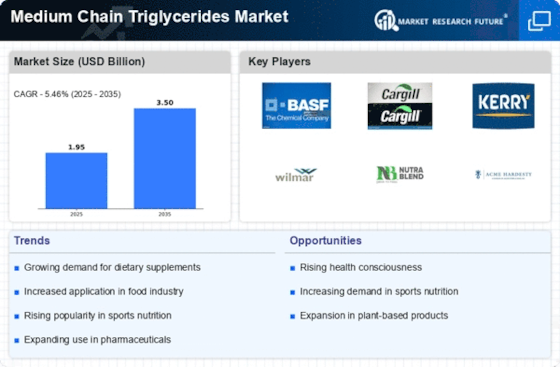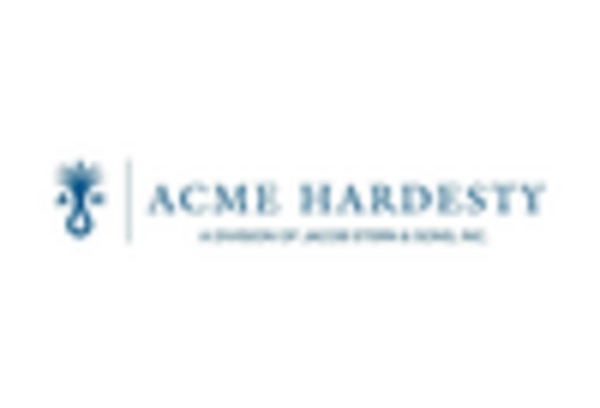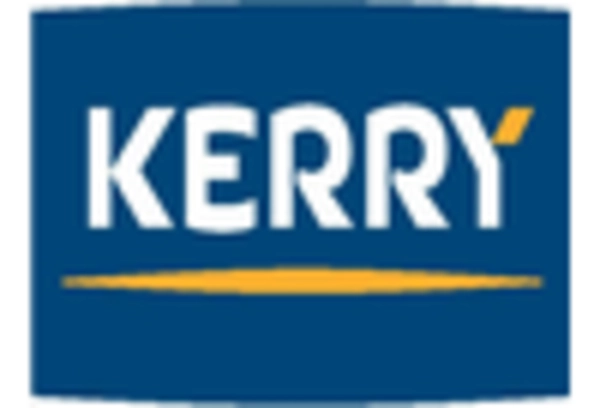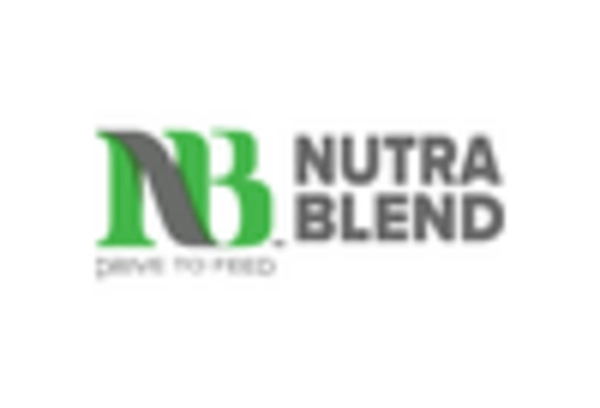Food Industry
Cosmetics Industry
Pharmaceuticals
Nutritional Supplements
Liquid
Powder
Emulsified
Coconut Oil
Palm Kernel Oil
Synthetic
Hospitals
Fitness Centers
Households
North America
Europe
South America
Asia Pacific
Middle East and Africa
North America Outlook (USD Billion, 2019-2035)
Medium Chain Triglycerides Market by Application Type
Food Industry
Cosmetics Industry
Pharmaceuticals
Nutritional Supplements
Medium Chain Triglycerides Market by Form Type
Liquid
Powder
Emulsified
Medium Chain Triglycerides Market by Source Type
Coconut Oil
Palm Kernel Oil
Synthetic
Medium Chain Triglycerides Market by End Use Type
Hospitals
Fitness Centers
Households
Medium Chain Triglycerides Market by Regional Type
US
Canada
US Outlook (USD Billion, 2019-2035)
Medium Chain Triglycerides Market by Application Type
Food Industry
Cosmetics Industry
Pharmaceuticals
Nutritional Supplements
Medium Chain Triglycerides Market by Form Type
Liquid
Powder
Emulsified
Medium Chain Triglycerides Market by Source Type
Coconut Oil
Palm Kernel Oil
Synthetic
Medium Chain Triglycerides Market by End Use Type
Hospitals
Fitness Centers
Households
CANADA Outlook (USD Billion, 2019-2035)
Medium Chain Triglycerides Market by Application Type
Food Industry
Cosmetics Industry
Pharmaceuticals
Nutritional Supplements
Medium Chain Triglycerides Market by Form Type
Liquid
Powder
Emulsified
Medium Chain Triglycerides Market by Source Type
Coconut Oil
Palm Kernel Oil
Synthetic
Medium Chain Triglycerides Market by End Use Type
Hospitals
Fitness Centers
Households
Europe Outlook (USD Billion, 2019-2035)
Medium Chain Triglycerides Market by Application Type
Food Industry
Cosmetics Industry
Pharmaceuticals
Nutritional Supplements
Medium Chain Triglycerides Market by Form Type
Liquid
Powder
Emulsified
Medium Chain Triglycerides Market by Source Type
Coconut Oil
Palm Kernel Oil
Synthetic
Medium Chain Triglycerides Market by End Use Type
Hospitals
Fitness Centers
Households
Medium Chain Triglycerides Market by Regional Type
Germany
UK
France
Russia
Italy
Spain
Rest of Europe
GERMANY Outlook (USD Billion, 2019-2035)
Medium Chain Triglycerides Market by Application Type
Food Industry
Cosmetics Industry
Pharmaceuticals
Nutritional Supplements
Medium Chain Triglycerides Market by Form Type
Liquid
Powder
Emulsified
Medium Chain Triglycerides Market by Source Type
Coconut Oil
Palm Kernel Oil
Synthetic
Medium Chain Triglycerides Market by End Use Type
Hospitals
Fitness Centers
Households
UK Outlook (USD Billion, 2019-2035)
Medium Chain Triglycerides Market by Application Type
Food Industry
Cosmetics Industry
Pharmaceuticals
Nutritional Supplements
Medium Chain Triglycerides Market by Form Type
Liquid
Powder
Emulsified
Medium Chain Triglycerides Market by Source Type
Coconut Oil
Palm Kernel Oil
Synthetic
Medium Chain Triglycerides Market by End Use Type
Hospitals
Fitness Centers
Households
FRANCE Outlook (USD Billion, 2019-2035)
Medium Chain Triglycerides Market by Application Type
Food Industry
Cosmetics Industry
Pharmaceuticals
Nutritional Supplements
Medium Chain Triglycerides Market by Form Type
Liquid
Powder
Emulsified
Medium Chain Triglycerides Market by Source Type
Coconut Oil
Palm Kernel Oil
Synthetic
Medium Chain Triglycerides Market by End Use Type
Hospitals
Fitness Centers
Households
RUSSIA Outlook (USD Billion, 2019-2035)
Medium Chain Triglycerides Market by Application Type
Food Industry
Cosmetics Industry
Pharmaceuticals
Nutritional Supplements
Medium Chain Triglycerides Market by Form Type
Liquid
Powder
Emulsified
Medium Chain Triglycerides Market by Source Type
Coconut Oil
Palm Kernel Oil
Synthetic
Medium Chain Triglycerides Market by End Use Type
Hospitals
Fitness Centers
Households
ITALY Outlook (USD Billion, 2019-2035)
Medium Chain Triglycerides Market by Application Type
Food Industry
Cosmetics Industry
Pharmaceuticals
Nutritional Supplements
Medium Chain Triglycerides Market by Form Type
Liquid
Powder
Emulsified
Medium Chain Triglycerides Market by Source Type
Coconut Oil
Palm Kernel Oil
Synthetic
Medium Chain Triglycerides Market by End Use Type
Hospitals
Fitness Centers
Households
SPAIN Outlook (USD Billion, 2019-2035)
Medium Chain Triglycerides Market by Application Type
Food Industry
Cosmetics Industry
Pharmaceuticals
Nutritional Supplements
Medium Chain Triglycerides Market by Form Type
Liquid
Powder
Emulsified
Medium Chain Triglycerides Market by Source Type
Coconut Oil
Palm Kernel Oil
Synthetic
Medium Chain Triglycerides Market by End Use Type
Hospitals
Fitness Centers
Households
REST OF EUROPE Outlook (USD Billion, 2019-2035)
Medium Chain Triglycerides Market by Application Type
Food Industry
Cosmetics Industry
Pharmaceuticals
Nutritional Supplements
Medium Chain Triglycerides Market by Form Type
Liquid
Powder
Emulsified
Medium Chain Triglycerides Market by Source Type
Coconut Oil
Palm Kernel Oil
Synthetic
Medium Chain Triglycerides Market by End Use Type
Hospitals
Fitness Centers
Households
APAC Outlook (USD Billion, 2019-2035)
Medium Chain Triglycerides Market by Application Type
Food Industry
Cosmetics Industry
Pharmaceuticals
Nutritional Supplements
Medium Chain Triglycerides Market by Form Type
Liquid
Powder
Emulsified
Medium Chain Triglycerides Market by Source Type
Coconut Oil
Palm Kernel Oil
Synthetic
Medium Chain Triglycerides Market by End Use Type
Hospitals
Fitness Centers
Households
Medium Chain Triglycerides Market by Regional Type
China
India
Japan
South Korea
Malaysia
Thailand
Indonesia
Rest of APAC
CHINA Outlook (USD Billion, 2019-2035)
Medium Chain Triglycerides Market by Application Type
Food Industry
Cosmetics Industry
Pharmaceuticals
Nutritional Supplements
Medium Chain Triglycerides Market by Form Type
Liquid
Powder
Emulsified
Medium Chain Triglycerides Market by Source Type
Coconut Oil
Palm Kernel Oil
Synthetic
Medium Chain Triglycerides Market by End Use Type
Hospitals
Fitness Centers
Households
INDIA Outlook (USD Billion, 2019-2035)
Medium Chain Triglycerides Market by Application Type
Food Industry
Cosmetics Industry
Pharmaceuticals
Nutritional Supplements
Medium Chain Triglycerides Market by Form Type
Liquid
Powder
Emulsified
Medium Chain Triglycerides Market by Source Type
Coconut Oil
Palm Kernel Oil
Synthetic
Medium Chain Triglycerides Market by End Use Type
Hospitals
Fitness Centers
Households
JAPAN Outlook (USD Billion, 2019-2035)
Medium Chain Triglycerides Market by Application Type
Food Industry
Cosmetics Industry
Pharmaceuticals
Nutritional Supplements
Medium Chain Triglycerides Market by Form Type
Liquid
Powder
Emulsified
Medium Chain Triglycerides Market by Source Type
Coconut Oil
Palm Kernel Oil
Synthetic
Medium Chain Triglycerides Market by End Use Type
Hospitals
Fitness Centers
Households
SOUTH KOREA Outlook (USD Billion, 2019-2035)
Medium Chain Triglycerides Market by Application Type
Food Industry
Cosmetics Industry
Pharmaceuticals
Nutritional Supplements
Medium Chain Triglycerides Market by Form Type
Liquid
Powder
Emulsified
Medium Chain Triglycerides Market by Source Type
Coconut Oil
Palm Kernel Oil
Synthetic
Medium Chain Triglycerides Market by End Use Type
Hospitals
Fitness Centers
Households
MALAYSIA Outlook (USD Billion, 2019-2035)
Medium Chain Triglycerides Market by Application Type
Food Industry
Cosmetics Industry
Pharmaceuticals
Nutritional Supplements
Medium Chain Triglycerides Market by Form Type
Liquid
Powder
Emulsified
Medium Chain Triglycerides Market by Source Type
Coconut Oil
Palm Kernel Oil
Synthetic
Medium Chain Triglycerides Market by End Use Type
Hospitals
Fitness Centers
Households
THAILAND Outlook (USD Billion, 2019-2035)
Medium Chain Triglycerides Market by Application Type
Food Industry
Cosmetics Industry
Pharmaceuticals
Nutritional Supplements
Medium Chain Triglycerides Market by Form Type
Liquid
Powder
Emulsified
Medium Chain Triglycerides Market by Source Type
Coconut Oil
Palm Kernel Oil
Synthetic
Medium Chain Triglycerides Market by End Use Type
Hospitals
Fitness Centers
Households
INDONESIA Outlook (USD Billion, 2019-2035)
Medium Chain Triglycerides Market by Application Type
Food Industry
Cosmetics Industry
Pharmaceuticals
Nutritional Supplements
Medium Chain Triglycerides Market by Form Type
Liquid
Powder
Emulsified
Medium Chain Triglycerides Market by Source Type
Coconut Oil
Palm Kernel Oil
Synthetic
Medium Chain Triglycerides Market by End Use Type
Hospitals
Fitness Centers
Households
REST OF APAC Outlook (USD Billion, 2019-2035)
Medium Chain Triglycerides Market by Application Type
Food Industry
Cosmetics Industry
Pharmaceuticals
Nutritional Supplements
Medium Chain Triglycerides Market by Form Type
Liquid
Powder
Emulsified
Medium Chain Triglycerides Market by Source Type
Coconut Oil
Palm Kernel Oil
Synthetic
Medium Chain Triglycerides Market by End Use Type
Hospitals
Fitness Centers
Households
South America Outlook (USD Billion, 2019-2035)
Medium Chain Triglycerides Market by Application Type
Food Industry
Cosmetics Industry
Pharmaceuticals
Nutritional Supplements
Medium Chain Triglycerides Market by Form Type
Liquid
Powder
Emulsified
Medium Chain Triglycerides Market by Source Type
Coconut Oil
Palm Kernel Oil
Synthetic
Medium Chain Triglycerides Market by End Use Type
Hospitals
Fitness Centers
Households
Medium Chain Triglycerides Market by Regional Type
Brazil
Mexico
Argentina
Rest of South America
BRAZIL Outlook (USD Billion, 2019-2035)
Medium Chain Triglycerides Market by Application Type
Food Industry
Cosmetics Industry
Pharmaceuticals
Nutritional Supplements
Medium Chain Triglycerides Market by Form Type
Liquid
Powder
Emulsified
Medium Chain Triglycerides Market by Source Type
Coconut Oil
Palm Kernel Oil
Synthetic
Medium Chain Triglycerides Market by End Use Type
Hospitals
Fitness Centers
Households
MEXICO Outlook (USD Billion, 2019-2035)
Medium Chain Triglycerides Market by Application Type
Food Industry
Cosmetics Industry
Pharmaceuticals
Nutritional Supplements
Medium Chain Triglycerides Market by Form Type
Liquid
Powder
Emulsified
Medium Chain Triglycerides Market by Source Type
Coconut Oil
Palm Kernel Oil
Synthetic
Medium Chain Triglycerides Market by End Use Type
Hospitals
Fitness Centers
Households
ARGENTINA Outlook (USD Billion, 2019-2035)
Medium Chain Triglycerides Market by Application Type
Food Industry
Cosmetics Industry
Pharmaceuticals
Nutritional Supplements
Medium Chain Triglycerides Market by Form Type
Liquid
Powder
Emulsified
Medium Chain Triglycerides Market by Source Type
Coconut Oil
Palm Kernel Oil
Synthetic
Medium Chain Triglycerides Market by End Use Type
Hospitals
Fitness Centers
Households
REST OF SOUTH AMERICA Outlook (USD Billion, 2019-2035)
Medium Chain Triglycerides Market by Application Type
Food Industry
Cosmetics Industry
Pharmaceuticals
Nutritional Supplements
Medium Chain Triglycerides Market by Form Type
Liquid
Powder
Emulsified
Medium Chain Triglycerides Market by Source Type
Coconut Oil
Palm Kernel Oil
Synthetic
Medium Chain Triglycerides Market by End Use Type
Hospitals
Fitness Centers
Households
MEA Outlook (USD Billion, 2019-2035)
Medium Chain Triglycerides Market by Application Type
Food Industry
Cosmetics Industry
Pharmaceuticals
Nutritional Supplements
Medium Chain Triglycerides Market by Form Type
Liquid
Powder
Emulsified
Medium Chain Triglycerides Market by Source Type
Coconut Oil
Palm Kernel Oil
Synthetic
Medium Chain Triglycerides Market by End Use Type
Hospitals
Fitness Centers
Households
Medium Chain Triglycerides Market by Regional Type
GCC Countries
South Africa
Rest of MEA
GCC COUNTRIES Outlook (USD Billion, 2019-2035)
Medium Chain Triglycerides Market by Application Type
Food Industry
Cosmetics Industry
Pharmaceuticals
Nutritional Supplements
Medium Chain Triglycerides Market by Form Type
Liquid
Powder
Emulsified
Medium Chain Triglycerides Market by Source Type
Coconut Oil
Palm Kernel Oil
Synthetic
Medium Chain Triglycerides Market by End Use Type
Hospitals
Fitness Centers
Households
SOUTH AFRICA Outlook (USD Billion, 2019-2035)
Medium Chain Triglycerides Market by Application Type
Food Industry
Cosmetics Industry
Pharmaceuticals
Nutritional Supplements
Medium Chain Triglycerides Market by Form Type
Liquid
Powder
Emulsified
Medium Chain Triglycerides Market by Source Type
Coconut Oil
Palm Kernel Oil
Synthetic
Medium Chain Triglycerides Market by End Use Type
Hospitals
Fitness Centers
Households
REST OF MEA Outlook (USD Billion, 2019-2035)
Medium Chain Triglycerides Market by Application Type
Food Industry
Cosmetics Industry
Pharmaceuticals
Nutritional Supplements
Medium Chain Triglycerides Market by Form Type
Liquid
Powder
Emulsified
Medium Chain Triglycerides Market by Source Type
Coconut Oil
Palm Kernel Oil
Synthetic
Medium Chain Triglycerides Market by End Use Type
Hospitals
Fitness Centers
Households


















Leave a Comment